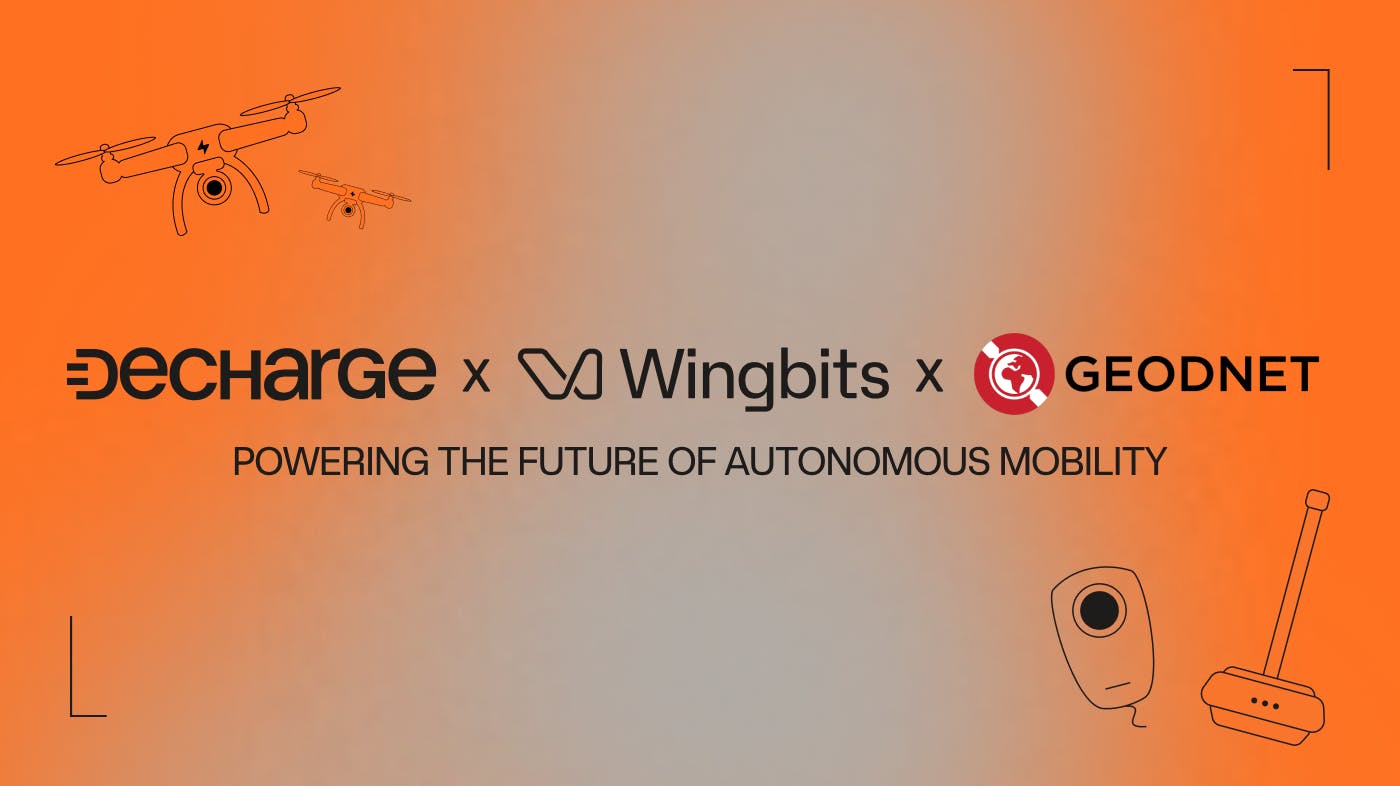Wingbits x DeCharge x GEODNET: Charging the Future of Flight - Machine to Machine
Wingbits
July 10, ‘25

Your drone just booked its own charging station…
What happens when flight tracking meets electric vehicle charging?
You get infrastructure that not only responds to movement, but anticipates it.
Today, we’re introducing a collaboration between Wingbits, DeCharge and GEODNET, three decentralized physical infrastructure networks joining forces to build a smarter, more autonomous world.
DeCharge is creating the “energy internet”, a decentralized EV charging network already in India with 350+ chargers, expanding fast into Southeast Asia, the US and Europe. All chargers are designed for machine to machine (M2M) transactions.
This partnership combines real-time flight and drone tracking with blockchain-powered EV charging, enabling M2M interactions like autonomous drone recharging, dynamic pricing for high-demand locations, and smarter deployment of hardware around the globe.
GEODNET adds a critical layer to the stack - real-time GNSS correction data for precise geolocation. With 18,000 devices globally, GEODNET provides their centimeter accuracy needed for autonomous vehicles and drones to find chargers, navigate safely and operate independently.
Drones that recharge themselves
The global drone market is booming. Currently valued at over $73 billion in 2024, it’s projected to grow to more than $160 billion by 2030, driven by use cases in logistics, mapping, public safety, agriculture, and autonomous delivery.
As these fleets scale and operations become more autonomous, one major bottleneck emerges: where and how drones recharge.
This is where Wingbits, DeCharge and GEODNET create a powerful synergy:
Wingbits provides real-time drone tracking, enabling fleet managers to monitor routes, arrivals, and energy usage.
GEODNET offers precise positioning data to guide drones to charge points.
DeCharge offers decentralized EV charging infrastructure, and we’re now exploring how to make it drone-compatible.
Together, we’re working on systems where drones autonomously identify, navigate to, and recharge at DeCharge stations, using Wingbits data to coordinate charging windows and optimize for availability, pricing and power load.
We’re optimizing the foundation for machine-to-machine infrastructure:
Where drones talk directly to chargers, negotiate rates and top up, all without human involvement.
And the timing couldn’t be better. According to analysts, hundreds of thousands to over 1 million autonomous aerial vehicles are expected to be operating in the global airspace by 2028, signaling urgent demand for scalable, autonomous recharging solutions.
Last week, Archer Aviation’s Midnight eVTOL completed its first public test flight in Abu Dhabi, marking a major step forward for self-flying air taxis. Similar tests from Joby Aviation in Dubai suggest we could see commercial autonomous air taxi operations as soon as 2026.
Joby Aviation's first eVTOL flying test, captured by Wingbits (June 30 2025)
Real-world data for real-time response
Even beyond drones, there’s huge potential in using live movement data to power smarter charging:
Flight arrivals = charging demand: Use Wingbits’ data to forecast traffic at airports and nearby charging hubs.
Dynamic pricing models: Automatically adjust rates based on time, congestion or upcoming drone/vehicle arrivals.
M2M logic: Let machines (not humans) trigger actions like charging, routing, and load balancing.
The long-term impact is an energy network that responds to how things move, not just how people drive.
Co-deploying smart infrastructure globally
Wingbits, GEODNET and DeCharge are expanding across five continents, and we’re working on ways to roll out infrastructure strategically and efficiently. Currently DeCharge shares charger location data, which can help Wingbits place sensors near high-demand, high-traffic areas.
Wingbits and GEODNET can also share coverage data, supporting DeCharge to identify drone- and EV-dense locations for new charging points
Additionally, with shared install partners, all projects can scale local deployment in India, Vietnam, Thailand, the US, and Europe. In fast-growing regions like Southeast Asia and South America, joint deployment saves cost and accelerates impact - especially in places where reliable data or energy access is still limited.
Bundled hardware, shared ecosystems
With this partnership, we’ll soon be offering bundled DePIN kits, including Wingbits ADS-B receivers + DeCharge chargers.
Host a Charging + Tracking Station
These bundles will include DeCharge EV chargers + Wingbits ADS-B receivers as deployment-ready kits.
Soon you will be able to:
Host them yourself in drone-heavy or EV-prone zones (homes, rooftops, shops, farmlands).
Or delegate them to our global installer network — we’ll place it in a high-traffic area and you still earn.
DeCharge has previously implemented successful bundle sales with DePIN projects, such as DePHY Network & GEODNET - and we’re building on that momentum.
Stay tuned for our follow up campaign with special promotions for the Wingbits community.
What's Next
In the coming months, we’re exploring:
Drone-compatible charging prototypes
Real-time pricing triggers based on flight or drone movement
Shared deployment rollouts in key global regions
Public APIs and dashboards for demand mapping
We believe the future of infrastructure is autonomous, data-driven, and decentralized. Let’s make it a reality by building it together!
Are you a drone fleet operator? An EV infra builder? A data dev or local installer? We’d love to chat.

Company
Wingbits is a DePIN (Decentralized Physical Infrastructure Network) that rewards community members with $WINGS tokens for monitoring aircraft in real-time using specialized ADS-B hardware. The network aligns incentives to compensate participants based on the quality and quantity of flight tracking data they contribute, creating a more equitable alternative to traditional tracking systems. By incentivizing strategic hardware placement and reliable uptime, Wingbits is building the world's largest and most secure flight tracking network while disrupting an industry that has relied on unpaid volunteers for decades.